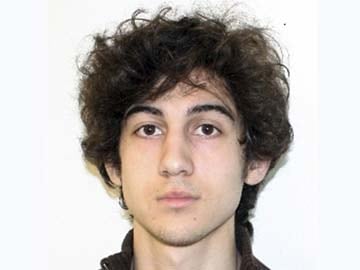
FILE - This file photo by the Federal Bureau of Investigation shows Dzhokhar Tsarnaev, surviving suspect in the Boston Marathon bombings who is accused in two bombings that killed three people and injured more than 260 others near the finish line of the A
Boston:
The Boston Marathon bombing suspects used "relatively sophisticated" bombs with fuses made from Christmas lights and remote-control detonators made from model car parts, federal prosecutors said Wednesday in a court filing.
The filing argued against a defence motion to throw out suspect Dzhokhar Tsarnaev's statements to FBI agents because he was questioned without a lawyer.
Prosecutors said the bombs, comments Tsarnaev and his brother made to a carjacking victim that they might explode more bombs in New York and a note Tsarnaev wrote in a boat where he was captured made it imperative to know if there was a continuing terror threat before informing him of his rights.
They said Tsarnaev told agents he and his brother, Tamerlan Tsarnaev, acted alone and there were no more bombs.
Dzhokhar Tsarnaev has pleaded not guilty to several federal charges. Prosecutors allege he and his brother planted two pressure cooker bombs near the marathon's finish line, killing three people and injuring more than 260. His brother was killed during a gunbattle with police on April 19, 2013, four days after the marathon bombing.
This month, lawyers for Dzhokhar Tsarnaev argued that the statements he made to authorities after he was arrested should be thrown out because he was questioned for 36 hours in a hospital room while suffering from gunshot wounds and without being told his rights.
The lawyers said in a flurry of pretrial court filings that federal agents began questioning Tsarnaev about 20 hours after he arrived at the hospital in critical condition and his statements can't be considered voluntary.
Federal investigators questioned him days after last year's deadly bombing without formally telling him of his right to a lawyer under a public safety exception allowed when there's concern about an ongoing threat. But defence attorneys said the questioning continued "despite the fact that he quickly allayed concerns about any continuing threat to public safety, repeatedly asked for a lawyer, and begged to rest." They said his treatment included painkillers that impaired his judgment and increased his susceptibility to pressure.
The filing argued against a defence motion to throw out suspect Dzhokhar Tsarnaev's statements to FBI agents because he was questioned without a lawyer.
Prosecutors said the bombs, comments Tsarnaev and his brother made to a carjacking victim that they might explode more bombs in New York and a note Tsarnaev wrote in a boat where he was captured made it imperative to know if there was a continuing terror threat before informing him of his rights.
They said Tsarnaev told agents he and his brother, Tamerlan Tsarnaev, acted alone and there were no more bombs.
Dzhokhar Tsarnaev has pleaded not guilty to several federal charges. Prosecutors allege he and his brother planted two pressure cooker bombs near the marathon's finish line, killing three people and injuring more than 260. His brother was killed during a gunbattle with police on April 19, 2013, four days after the marathon bombing.
This month, lawyers for Dzhokhar Tsarnaev argued that the statements he made to authorities after he was arrested should be thrown out because he was questioned for 36 hours in a hospital room while suffering from gunshot wounds and without being told his rights.
The lawyers said in a flurry of pretrial court filings that federal agents began questioning Tsarnaev about 20 hours after he arrived at the hospital in critical condition and his statements can't be considered voluntary.
Federal investigators questioned him days after last year's deadly bombing without formally telling him of his right to a lawyer under a public safety exception allowed when there's concern about an ongoing threat. But defence attorneys said the questioning continued "despite the fact that he quickly allayed concerns about any continuing threat to public safety, repeatedly asked for a lawyer, and begged to rest." They said his treatment included painkillers that impaired his judgment and increased his susceptibility to pressure.
Track Latest News Live on NDTV.com and get news updates from India and around the world

